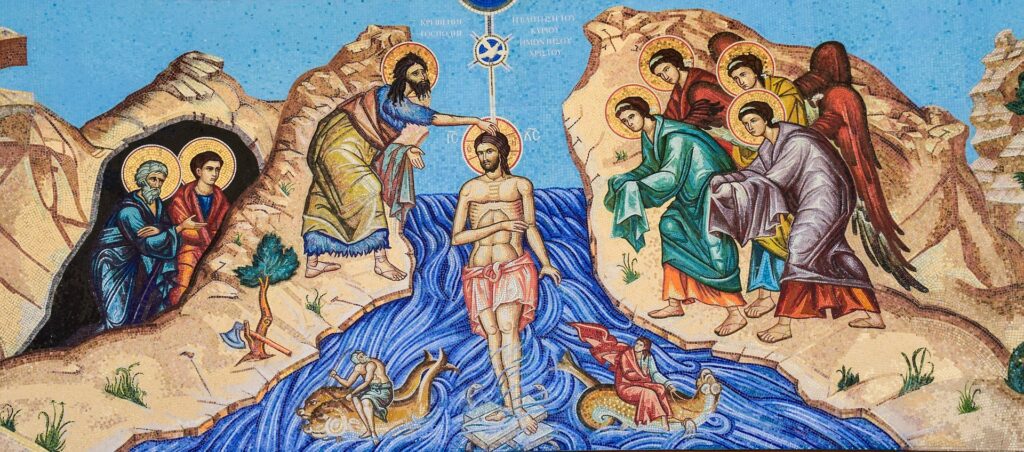This page may contain affiliate links, which means I may receive a commission from purchases made through links.
When Jesus was finished clearing the temple on Passover, he was evidently doing a number of miracles. We are told in John 2:23 that “many believed in his name when they saw the signs that he was doing.” Following this scene, John gives us the details of a rare one-on-one conversation with Jesus, where the Lord teaches Nicodemus about being born of the Spirit.
“Now there was a man of the Pharisees named Nicodemus, a ruler of the Jews. This man came to Jesus by night and said to him, ‘Rabbi, we know that you are a teacher come from God, for no one can do these signs that you do unless God is with him'” (John 3:1-2)
Nicodemus was well aware that Jesus’ prophetic ministry was validated by his miracles, just as some other prophets of old. He wanted to believe. He wanted to be faithful to his God and honor those sent by him. However, he comes to Jesus at night, in secret. He probably felt unsafe because, as chapter 2 reveals, many of the other Jewish leaders were very opposed to Jesus’ ministry. Despite the majority disdain for Jesus, Nicodemus doesn’t only speak for himself. He doesn’t say, “I know that you are a teacher,” but “we know” (v. 2). This indicates that multiple people were suspicious that Jesus was more than just some grifter or troublemaker. Perhaps this includes those who opposed him. Perhaps not. We aren’t told. But Nicodemus hints to the reader that at least two, possibly more, Jewish leaders were inclined to take Christ’s miracles as signs from God.
And rather than saying thank you, or praising Nicodemus for being open to his ministry, Jesus comes in hot: “Truly, truly, I say to you, unless one is born again he cannot see the kingdom of God” (John 3:3). In true Jesus fashion, he makes a statement that makes little sense at face value to his audience.
Born Twice?
“Nicodemus said to him, ‘How can a man be born when he is old? Can he enter a second time into his mother’s womb and be born?'” (John 3:4). Certainly a reasonable question. It is possible Nicodemus was not seriously asking. He may have just been keeping the conversation going, hoping for Jesus to explain this phrase “born again.”
Apparently, this teacher fell victim to the complexities of translation, just as many English readers do. A word Jesus uses is the Greek anothen, which is translated as “again.” An alternate meaning would be “from above.” In this case, there is a bit of a double-entendre. The birth Jesus speaks of is certainly a second birth to our first one. But his point was not for anyone to be born a second time in the same way as the first. The image Nicodemus gives us of reentering a mother’s womb gets worse the more one thinks about it. So I urge you not to dwell with that thought. It was definitely not what the Lord had in mind.
When Jesus says that people must be born anothen, he is saying we need to be given a birth that is not from earth, but from above, or from heaven. He goes on: “Truly, truly, I say to you, unless one is born of water and the Spirit, he cannot enter the kingdom of God. That which is born of the flesh is flesh, and that which is born of the Spirit is spirit. Do not marvel that I said to you, ‘You must be born again.’ The wind blows where it wishes, and you hear its sound, but you do not know where it comes from or where it goes. So it is with everyone who is born of the Spirit” (John 3:5-8).
Born of Water?
In his explanation of what it means to be born from above, he shows us it is a work of the Spirit of God. It is something we do not see with our eyes, but rather, we “hear its sound” as we do with the wind. And this experience of being born from above, Jesus indicates, is required in order to see the kingdom of God (v. 3).
We must be born of both “water and the Spirit” (John 3:5). This phrase is a difficulty to interpret, because it is unique. There are no other contemporary literary works that are known to modern man which use the phrase “born of water,” so we don’t can’t look at how this idea might have been used in the time of Christ. Throughout the history of Christianity, the dominant view, still held by Roman Catholics, the various branches of Orthodoxy, and a few more liturgical Protestant groups, is that to be “born of water and the Spirit” is what happens when someone is baptized into the church. In these sacrament-heavy traditions, they rely greatly on the expositions of early Church Fathers. It is part of a doctrine called baptismal regeneration, in which, through the laying on of hands, a priest (or elder) baptizes a person and imparts the Spirit to them, thus forgiving all past sins and initiating them into the community of believers.
Despite my belief that this doctrine is an error that contradicts Scripture in several ways, it is not my intention in this post to argue against it. Acknowledging that many faithful followers of Christ down through the ages have held this belief, and used other Scriptural passages to support it, here I am focusing primarily on whether or not this statement of Christ in John 3 can be used to support it.
Several factors tell me that this reference to water in verse 5 is not a reference to Christian baptism. First, baptism is not specifically mentioned in the immediate text as a viable interpretation. And sure, the Scriptures don’t just lay out proper interpretations for us all the time. This is, however, a common practice of John in his gospel.
He interprets several statements of Christ for the reader. In John 12:32, Jesus says, “And I, when I am lifted up from the earth, will draw all people to myself.” John follows up in verse 33 by saying, “He said this to show by what kind of death he was going to die.”
Again, in John 7:38, Jesus says of those who believe in him, “Out of his heart will flow rivers of living water.” And in verse 39, John tells us, “Now this he said about the Spirit, whom those who believed in him were to receive, for as yet the Spirit had not been given, because Jesus was not yet glorified.”
These are only 2 examples, but it tells us that John has a habit of explaining those unclear sayings of Christ when he assumes that readers need hindsight to correctly understand them. Now I am not using an argument from silence to make my case, except insofar as we can infer from this practice of John that the interpretation should be understood from the immediate text, not necessarily from what early Christians thought about it.
The second reason I believe this passage is unrelated to baptism is that Christian baptism had not yet been instituted, yet Jesus seems to presume that Nicodemus should have known what he was getting at. John tells us that “Nicodemus said to him, ‘How can these things be?’ Jesus answered him, ‘Are you the teacher of Israel and yet you do not understand these things? Truly, truly, I say to you, we speak of what we know, and bear witness to what we have seen, but you do not receive our testimony. If I have told you earthly things and you do not believe, how can you believe if I tell you heavenly things?'” (John 3:9-12).
Why would Jesus expect a teacher of Israel to understand that this new birth by the Spirit takes place through the sacrament of baptism, when there was not yet a concept of the “trinitarian formula” that many of these traditions claim makes for a valid, regenerative baptism (“in the name of the Father and of the Son and of the Holy Spirit,” per Matthew 28:19). The sort of baptism that Jews of his day practiced was looked upon as merely a symbol of repentance. This would have been Nicodemus’ only point of reference for baptism, so Jesus message would have been quite impossible for him to grasp if he were trying to communicate the post-resurrection sacrament.
Finally, it is very likely that Jesus himself explains what he means by his rhetorical structure. Listen again to the way Jesus says it: “Truly, truly, I say to you, unless one is born of water and the Spirit, he cannot enter the kingdom of God. That which is born of the flesh is flesh, and that which is born of the Spirit is spirit” (John 3:5-6).
To me, it seems clear that Jesus is separating water and Spirit, making water to be the first birth one experiences of the flesh, and Spirit to be the second. There is debate about what aspect of physical birth water is associated with. It could be the amniotic fluid involved when a woman delivers a child, as Dr. Willem H. Oliver contends for in his Verbum et Ecclesia article, “The Water in John 3:5.” Another option is that it refers to Israel’s “birth” as a nation from the crossing of the waters during their exodus from Egypt, discussed by Dr. Michael S. Heiser on the Naked Bible Podcast, Episode 330. Either way, it is difficult to make a case for baptism in this passage beyond “the Church Fathers say so.”
Born of the Spirit
This conversation between Jesus and Nicodemus is longer than we can cover in a single post. For now, it is important to remember who Jesus is talking to. This Pharisee is spiritually hungry. He is inclined to believe in Jesus. At first was giving credit to Jesus, yet right off the bat, Jesus put forth a challenging remark: “Truly, truly, I say to you, unless one is born again he cannot see the kingdom of God” (John 3:3).
Even though he did not yet understand it, this was exactly what Nicodemus needed to hear. Most of the Jews of Jesus’ day looked forward to a time when all the Israelites would be brought back into their land out of their exile and dispersion, no longer bound by the tyranny of Gentile oppressors. To them, the kingdom of God was the nation of Israel being one again under the rulership of the line of King David.
They weren’t wrong about this entirely, but they had an incomplete picture of it. See, Jesus was “descended from David according the flesh” (Romans 1:3), he would be glorified as the King of Israel, and he did come to bring back the tribes of Israel, but not in the way that people like Nicodemus would expect.
We have discussed in several ways how John’s gospel makes a heavy theological point about the temple and the nation of Israel. And this passage is no exception. Nicodemus needed to know that his heritage was not enough to get him into the kingdom that Jesus would bring. The New Covenant Israel would be one not of ancestry but of the Spirit, making children of Abraham out of those who were not so by blood or by law (Romans 4:13-17). By being born of the Spirit, we join the community of the Spirit, the people of God.
The new birth is a mystery. We can’t see what the Spirit does in a person to produce that birth, but we can see and hear the effect (John 3:8). Some people have a conversion experience they never forget. They have their “birthday” memorized and celebrate how old they are in Christ. These are often markedly different people than they were before their new birth, radically transformed by the Spirit of God. Others grow up in the faith and are gradually discipled as little children, never really knowing the exact moment they were born from heaven, just knowing that it must have happened somewhere down the line, because as long as they can remember, they have desired to serve God and know him.
Be encouraged today that it doesn’t matter which one you are. It matters only that you know that you have been born from above, imparted with God’s Spirit to make you a child of God. If there is any doubt, ask God to show you how he is working in your life. Ask him to renew your heart and give you his desires. Allow the Spirit to lead your life. You will not regret it.
*If you enjoyed this post, please comment your thoughts down below and consider subscribing to receive updates on new blog posts.



